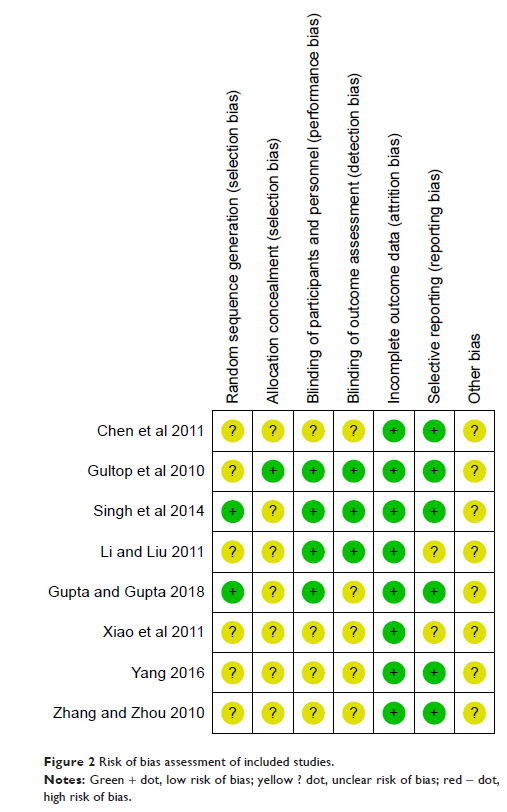108384
论文已发表
注册即可获取德孚的最新动态
IF 收录期刊
- 3.4 Breast Cancer (Dove Med Press)
- 3.2 Clin Epidemiol
- 2.6 Cancer Manag Res
- 2.9 Infect Drug Resist
- 3.7 Clin Interv Aging
- 5.1 Drug Des Dev Ther
- 3.1 Int J Chronic Obstr
- 6.6 Int J Nanomed
- 2.6 Int J Women's Health
- 2.9 Neuropsych Dis Treat
- 2.8 OncoTargets Ther
- 2.0 Patient Prefer Adher
- 2.2 Ther Clin Risk Manag
- 2.5 J Pain Res
- 3.0 Diabet Metab Synd Ob
- 3.2 Psychol Res Behav Ma
- 3.4 Nat Sci Sleep
- 1.8 Pharmgenomics Pers Med
- 2.0 Risk Manag Healthc Policy
- 4.1 J Inflamm Res
- 2.0 Int J Gen Med
- 3.4 J Hepatocell Carcinoma
- 3.0 J Asthma Allergy
- 2.2 Clin Cosmet Investig Dermatol
- 2.4 J Multidiscip Healthc

利多卡因预处理可降低依托咪酯诱导的肌阵挛发生率和严重程度:对随机对照试验的一项综合分析
Authors Lang B, Zhang L, Yang C, Lin Y, Zhang W, Li F
Received 14 May 2018
Accepted for publication 5 September 2018
Published 4 October 2018 Volume 2018:12 Pages 3311—3319
DOI https://doi.org/10.2147/DDDT.S174057
Checked for plagiarism Yes
Review by Single-blind
Peer reviewers approved by Dr Cristina Weinberg
Peer reviewer comments 2
Editor who approved publication: Dr Sukesh Voruganti
Objective: One conundrum that frequently occurs during clinical anesthesia is
etomidate-induced myoclonus, which results in multiple risks. The aim of the
study was to evaluate systematically the effect of pretreatment with lidocaine
on preventing etomidate-induced myoclonus.
Materials and
methods: The literature search was performed
from the inception to April 2018 in PubMed, Embase, Cochrane Library, and China
National Knowledge Infrastructure. All randomized controlled trials that used
lidocaine to prevent etomidate-induced myoclonus were enrolled. The primary
outcome included the incidence and severity of etomidate-induced myoclonus. The
data were combined to calculate the risk ratio and relevant 95% CI. A meta-analysis
was performed following the guidelines of the Cochrane
Reviewer’s Handbook and the Preferred Reporting Items for
Systematic Reviews and Meta Analyses statement.
Results: A total of eight studies were enrolled, and the existing evidence
indicated that 1) pretreatment with lidocaine can reduce the incidence of
etomidate-induced myoclonus (the incidence of myoclonus: 37.6% in lidocaine vs
73.6% in saline, risk ratio =0.46, with 95% CI [0.34, 0.63], P <0.0001); 2) the pretreatment
with lidocaine can reduce the incidence of mild, moderate, and severe
myoclonus; 3) a dose of pretreatment with lidocaine cannot significantly
decrease the duration of myoclonus compared to placebo; 4) the administration
of lidocaine produced no effect on the stable hemodynamic parameters and no
more additional adverse effects.
Conclusion: Pretreatment with lidocaine could be served as one effective
approach to decrease both the incidence and the severity of etomidate-induced
myoclonus, with limited influence on the hemodynamic stability of patients.
However, to confirm precise safety and efficacy of such intervention, more
high-quality evidence is necessary.
Keywords: lidocaine, etomidate, myoclonus, meta-analysis
